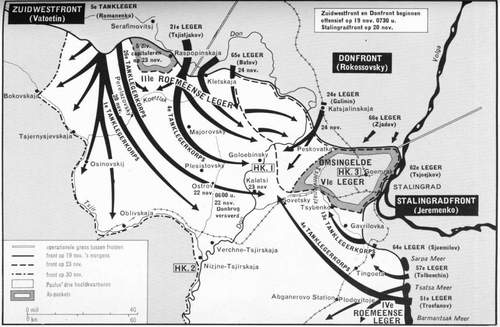DISASTER AT STALINGRAD
Hitler and the principal generals of OKW were lingering on in the pleasant Alpine surroundings of Berchtesgaden when the first news of the Russian counteroffensive on the Don reached them a few hours after it had been launched in a blizzard at dawn on November 19. Though a Soviet attack in this region had been expected it was not believed at OKW that it would amount to enough to warrant Hitler and his chief military advisers, Keitel and Jodl, hurrying back to headquarters in East Prussia after the Fuehrer’s ringing beerhouse speech to the old party comrades in Munich on the evening of November 8. So they had puttered about on the Obersalzberg taking in the mountain air.
Their peace and quiet was abruptly broken by an urgent telephone call from General Zeitzler, the new Chief of the Army General Staff, who had remained behind at Rastenburg. He had what the OKW Diary recorded as “alarming news.” In the very first hours of the attack an overwhelming Russian armored force had broken clean through the Rumanian Third Army between Serafimovich and Kletskaya on the Don just northwest of Stalingrad. South of the besieged city other powerful Soviet forces were attacking strongly against the German Fourth Panzer Army and the Rumanian Fourth Army and threatening to pierce their fronts.

The Russian objective was obvious to anyone who looked at a map and especially obvious to Zeitzler who, from Army intelligence, knew that the enemy had massed thirteen armies, with thousands of tanks, in the south to achieve it. The Russians were clearly driving in great strength from the north and the south to cut off Stalingrad and to force the German Sixth Army there to either beat a hasty retreat to the west or see itself surrounded. Zeitzler later contended that as soon as he saw what was happening he urged Hitler to permit the Sixth Army to withdraw from Stalingrad to the Don bend, where the broken front could be restored. The mere suggestion threw the Fuehrer into a tantrum.
“I won’t leave the Volga! I won’t go back from the Volga!” he shouted, and that was that. This decision, taken in such a fit of frenzy, led promptly to disaster. The Fuehrer personally ordered the Sixth Army to stand fast around Stalingrad.
Hitler and his staff returned to headquarters on November 22. By this time, the fourth day of the attack, the news was catastrophic. The two Soviet forces from the north and south had met at Kalach, forty miles west of Stalingrad on the Don bend. In the evening a wireless message arrived from General Paulus, commander of the Sixth Army, confirming that his troops were now surrounded. Hitler promptly radioed back, telling Paulus to move his headquarters into the city and form a hedgehog defense. The Sixth Army would be supplied by air until it could be relieved.
But this was futile talk. There were now twenty German and two Rumanian divisions cut off at Stalingrad. Paulus radioed that they would need a minimum of 750 tons of supplies a day flown in. This was far beyond the capacity of the Luftwaffe, which lacked the required number of transport planes. Even if they had been available, not all of them could have got through in the blizzardy weather and over an area where the Russians had now established fighter superiority. Nevertheless, Goering assured Hitler that the Air Force could do the job. It never began to.
The relief of the Sixth Army was a more practical and encouraging possibility. On November 25 Hitler had recalled Field Marshal von Manstein, the most gifted of his field commanders, from the Leningrad front and put him in charge of a newly created formation, Army Group Don. His assignment was to push through from the southwest and relieve the Sixth Army at Stalingrad.
But now the Fuehrer imposed impossible conditions on his new commander. Manstein tried to explain to him that the only chance of success lay in the Sixth Army’s breaking out of Stalingrad to the west while his own forces, led by the Fourth Panzer Army, pressed northeast against the Russian armies which lay between the two German forces. But once again Hitler refused to draw back from the Volga. The Sixth Army must remain in Stalingrad and Manstein must fight his way to it there.
